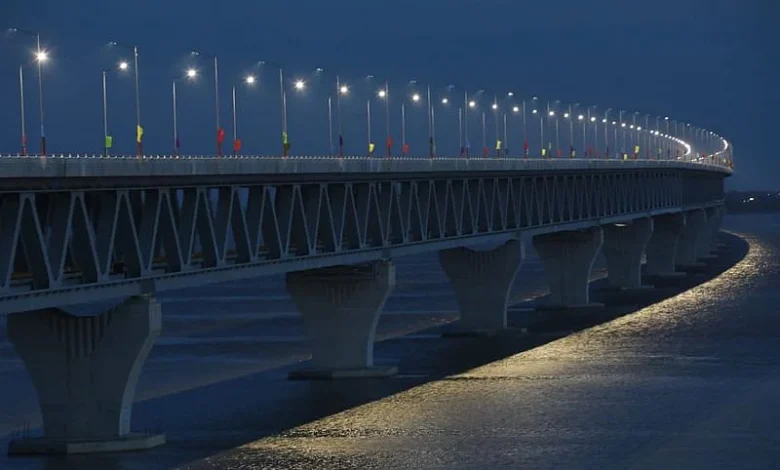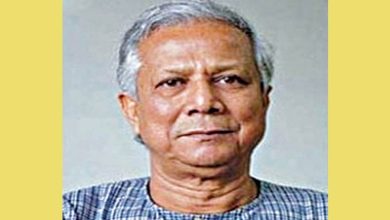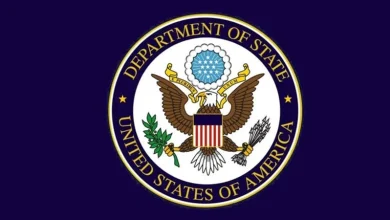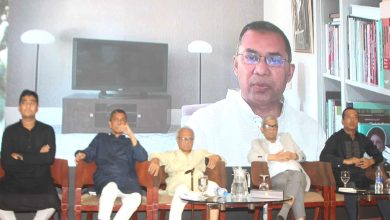Chinese firm asks for additional Tk 10b on river training

Chinese contractor firm Sinohydro Corporation, which is carrying out the river training part of the Padma Bridge, sent a letter to the Bridges Division asking for an additional 10 billion taka outside the purview of their contract while the Bridges Division wants to settle the bargain with 6 billion taka.
A raise in a project budget showing extra work outside the contract is called variation. An official of the Bridges Division told on condition of anonymity that variation means the contractor has done more than the work stipulated in the agreement and there are opportunities to take advantage of it because contractors withdraw extra money many times in collusion with other stakeholders without even doing the actual work.
The Bridges Division appointed the Chinese firm for river training on both sides of the Padma River in 2014 at 87.08 billion taka, but the budget increased by 8.78 billion taka to 95.86 billion taka in September 2023 because of additional work, a rise in dollar prices and changes to the government’s VAT-tax structure.
Bridges Division said river training work of the Padma Bridge project has already set a record as no firm was ever appointed in the past for such a hefty amount for river training under a single contract. With an additional 6 billion taka, the revised budget will rise to 101.86 billion taka.
Prime minister Sheikh Hasina opened Padma Bridge for traffic on 25 June 2022. Toll collection crossed 15 billion taka. A part of river training remained left when the bridge opened. However, the timeline of the entire Padma Bridge project including the river is going to end next June.
In the meantime, the Bridges Division started reaching out to the Planning Commission and other government agencies to settle the contractor’s bargain. Bridges Division secretary Md Manzur Hossain held a meeting with the officials of the Planning Commission and other agencies concerned on 28 April.
Padma Bridge project director Md Shafiqul Islam told the additional expenditure on river training, however, will not increase the entire project expenditure because there are funds for variation in the project budget, which rose to 326.05 billion taka after a revision in April last year.
Sources at Bridges Division said an additional 10 billion taka was allocated during the last amendment to the project budget considering the price hike and more possible work despite the project is nearly finished. Now, the contractor’s demand would be met with that money, but it needs the approval of the government.
River training has been done on 12.92 km on both sides of Padma River – 1.84 km at Mawa end and 11.8 km at Zazira end.
According to Bridges Division sources, when the project proposal was amended last year, it was found that the cost was reduced on the main work of river training but increased on the work done outside the agreement. This time, the Chinese firm did not do the work, for which additional funds are being sought. They appointed subcontractors without competitive tender.
Sources said Mazid Sons Construction Limited was one of the leading subcontractors and they were at central of the ‘pillow scandal’ at Rooppur Nuclear Power Plant and the roof collapse of a dormitory at Rajshshi University.
Reasons behind past cost rises
Sources at Bridges Division said the project cost rose by over 5 billion taka in September 2023 due to the depreciation of the taka and the rise in tax rate. Other than this, the timeline of river training work was four years, but it took an additional four and a half years, and costs also increased due to price hikes and consultants’ salaries and allowances.
Besides, setting tolls plazas, procuring vessals for surveys, installing optical fibres and various procurements are done under river training. Foreign workers could not come amid the pandemic, and that loss has also been counted as a cost. Contractors also show additional expenditures for floods and river currents at various times.
Chinese Sinohydro Corporation, however, receives 70 per cent of payment set in US dollars and 30 per cent in taka as per the contract.
Total project expenditure
The Padma Bridge was first approved in August 2007 at an estimated cost of 101.62 billion taka and the project deadline was 2015. By June 2011, project cost rose to 205.07 billion taka.
The government revised the project cost to 297.93 billion taka in February 2015, setting 2018 as the deadline. Cost rose by 14 billion taka for additional land procumbent purposes in June 2018 and the total project cost was set at 300.93 billion taka following a special approval. Lastly, the cost was fixed at 326.05 billion taka in 2023.
Regarding the additional cost of river training, Shamsul Haque, a mega project expert and civil engineering professor at Bangladesh University of Engineering and Technology (BUET), told Prothom Alo that it is a complex task to carry out river training in a river like the Padma, but a 17 per cent variation is too much.
He said there has been a trend recently to show big variations in the mega projects, and the cost was increased by adding unnecessary tasks in many cases; these tasks were completed through subcontractors with political influence. As a result, project cost rises and work quality falls, but the government’s Implementation Monitoring and Evaluation Division (IMED) has the opportunity to work with more responsibility to this end, he added.





